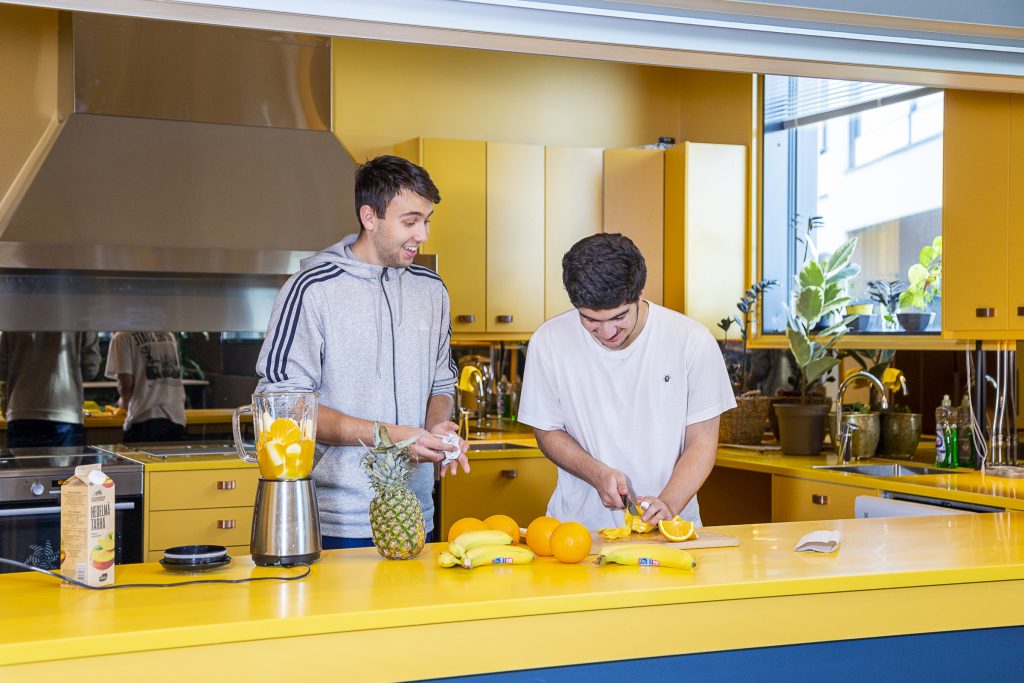
Eco-cooking
What we eat affects our environment.
About a third of our environmental impact as consumers is caused by food. The essential questions are: how much animal products (e.g. meat and cheese) do we eat, and how much do we throw food away as waste. Vegetable-focused food is a healthy and globally more sustainable option than a diet rich in animal-derived ingredients.
In the youth centre kitchen, chef club and café business, it is natural to address many environmental issues related to ecological everyday life, such as seasonal and local food, sorting, energy saving in cooking, saving hot water and using environmentally friendly detergents. Ethical issues can be approached through organic and Fair Trade.
Food is more than just environmental impacts and health; it is always also culture and the output of culture. From a cultural point of view, activities can include worldwide, personal and in-depth content.
1. A close relationship with nature and art: Experiences together
- Creative cooking together
Cooking evenings open to everyone are organised at the youth centre, to which each participant brings something when they come. Together, we will think about what is made from imported foods. In every culture, food and eating are much more than just simply alleviating hunger. Making food and eating together allows you to learn a wide range of things about yourself and others. - Decorate the café so that it is cosy and atmospheric
Let’s make a pleasant, beautiful moment in the chef’s club when eating together, taking everyone into account. Set the table nicely and place a tablecloth on the table. - Cooking love food (An idea from a youth centre “love week”).
- Organise a joint picnic in the park
- Create your favourite autumn food in the chef club.
Let’s make each group member’s favourite food alternately throughout the autumn. - Cultural café evenings can be organised where dishes from different cultures are served.
- Fennovegee, functional and carbohydrates
Let’s become acquainted with different diets in the chef club and consider how we sometimes eat for a reason other than hunger. - Take a hike through the autumn forest, picking up mushrooms, wild vegetables and berries www.hortoilu.fi
2. Environmental deeds: Things to do together
- Plan together with the young people what to buy for a chef club, café or event. It is also good to take into account ecological aspects in the youth centre kitchen activity, which are:
– plant emphasis
– seasonal products
– local food
– organic
– Fair trade products
– sensibly packed
– appropriate amounts, so as not to be wasted
- Growing vegetables in the yard, flower boxes or on windows
of the youth centre for the use of the chef club. You can get advice and help with farming from the Kumpula school nursery and the Meriharju Nature House. kaupunkiviljely.fi - Organise eco-Christmas parties or climate parties.
Food causes an average of a quarter of a single Finn’s carbon dioxide emissions. Consider together how climate impacts could be reduced in youth centre cooking and café operations. Let’s decide together on the guidelines. - Make a large World Map for the kitchen wall, marking the countries of origin of the food used in the café or chef club for a month. Information can be found on the packaging. Discuss the map together: Do our foods travel long distances? Is it a good thing or a bad thing? What shall we choose in the future?
- Participate in Fair Trade Weeks and come up with activities for it together
www.reilukauppa.fi - Donate part of the coffee income for a good purpose, e.g. apply for a collection box from Refugee Aid.
- Celebrate Hunger Day at a youth centre, participate in a fundraiser, or otherwise display the issue. www.finnishredcross.fi
- Let’s put together ideas for energy-saving cooking on the kitchen cabinet door. Let’s make instructions for them. Let’s try an electric-free chef club sometimes!
- Take care of waste sorting, and clean together with eco-labelled detergents and eco-efficient tools (e.g. dish brushes with a changing head).
- Only reusable dishes are used. If it is sometimes necessary to use disposable containers, then choose those that can be recycled (biodegradable or cardboard recyclable containers).
3. Own inspirations: Ideas & information
- The origin of all our food is the sun.
In cooking and café operations, the flow of solar energy can be considered. When we eat, we consume the energy of the sun. Reflection on the flow of energy can be started even by thinking about what we are hungry for. We may not feel very “sunny” when our energy is low. - However, let us consider why there is not enough food in sunny countries. Let’s discuss what else is needed, besides the sun (water, nutrients, soil, seeds, etc.), and whether all people in the world have enough of them.
- Let’s think about where hunger and poverty come from. Check out the UN World Food Programme website, which also has videos on the subject.
